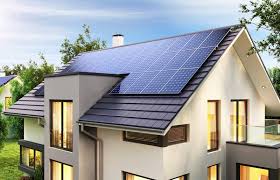In today’s world, energy efficiency and sustainability are more important than ever. A solar electric system can transform how you power your home, offering both environmental and financial benefits. Solar energy harnesses sunlight to generate electricity, reducing your reliance on traditional energy sources. This shift not only lowers your utility bills but also contributes to a cleaner planet.
Understanding Solar Electric Systems
A solar electric system, also known as a photovoltaic (PV) system, converts sunlight into electricity. The main components of a solar system include solar panels, an inverter, a mounting system, and batteries (if used for energy storage).
-
Solar Panels:
These are the most visible parts of an electric system. Made up of photovoltaic cells, solar panels capture sunlight and convert it into direct current (DC) electricity.
-
Inverter:
The inverter plays a critical role in the system. It converts the DC electricity generated by the solar panels into alternating current (AC) electricity, which is used to power your home appliances.
-
Mounting System:
This component secures the solar panels to your roof or ground. Proper installation is vital for maximizing sunlight exposure and ensuring the system’s longevity.
-
Energy Storage (Batteries):
Some electric systems include batteries for storing excess energy. This allows you to use solar power even when the sun isn’t shining.
How Solar Electric Systems Work
Solar electric systems operate by capturing sunlight and converting it into electricity through several steps:
-
Sunlight Absorption:
Solar panels absorb sunlight using photovoltaic cells. When sunlight hits these cells, it knocks electrons loose, creating a flow of electricity.
-
Conversion to AC Power:
The direct current produced by the panels is sent to the inverter. Here, the DC electricity is converted to AC electricity for use in your home.
-
Powering Your Home:
Once converted, the electricity flows into your home’s electrical system, powering your lights, appliances, and other devices.
-
Net Metering:
If your electric system produces more energy than you consume, the excess electricity can be fed back into the grid. Many utility companies offer net metering, allowing you to earn credits for the surplus energy you provide.
Benefits of Installing a Solar Electric System
Investing in a solar electric system offers numerous advantages. Here are some key benefits:
-
Reduced Energy Bills:
By generating your own electricity, you can significantly lower your monthly utility bills. Depending on your energy usage and system size, savings can be substantial.
-
Environmental Impact:
Solar energy is clean and renewable. By switching to a solar system, you reduce your carbon footprint and help combat climate change.
-
Increased Home Value:
Homes with solar energy systems often sell for more than those without. Potential buyers recognize the long-term savings and environmental benefits.
-
Energy Independence:
With an electric system, you reduce your dependence on traditional energy sources and protect yourself from rising energy costs.
-
Government Incentives:
Many governments offer tax credits, rebates, and incentives for installing solar systems. These can significantly offset installation costs, making solar energy more accessible.
Choosing the Right Solar Electric System for Your Home
Selecting the best electric system involves several considerations. Here are some key factors to keep in mind:
-
Energy Needs:
Assess your energy consumption to determine how much electricity you need. Review your utility bills to understand your average monthly usage.
-
Roof Condition and Orientation:
Your roof’s condition and orientation affect solar panel performance. South-facing roofs typically receive the most sunlight, maximizing energy production.
-
Available Space:
Ensure you have enough space for the solar panels. If roof space is limited, consider ground-mounted systems.
-
Budget:
Determine your budget for installation. Keep in mind the long-term savings and incentives available, which can help offset initial costs.
-
Installer Reputation:
Choose a reputable solar installation company with experience and positive customer reviews. Quality installation is essential for system performance.
Maintenance and Care for Your Solar Electric System
Once you’ve installed a solar electric system, regular maintenance will ensure it operates efficiently. Here are some maintenance tips:
-
Regular Cleaning:
Dust, dirt, and debris can accumulate on solar panels, reducing their efficiency. Cleaning them periodically helps maintain optimal performance.
-
Inspections:
Have your solar system inspected by a professional every few years. This can help identify any issues before they become serious problems.
-
Monitoring:
Many solar systems come with monitoring apps. These allow you to track energy production and ensure your system is working correctly.
-
Battery Maintenance:
If you have a battery storage system, follow the manufacturer’s guidelines for maintenance to ensure long battery life.
Conclusion
A solar electric system is an excellent investment for homeowners looking to save money, reduce their carbon footprint, and gain energy independence. With the right system in place, you can enjoy significant savings on your utility bills while contributing to a more sustainable future. If you’re considering switching to solar energy, now is the time to explore your options and find the perfect solution for your home.
Ready to save on energy bills and embrace sustainability? Contact Berthoud Solar Company today to learn more about installing a solar electric system that meets your needs!



